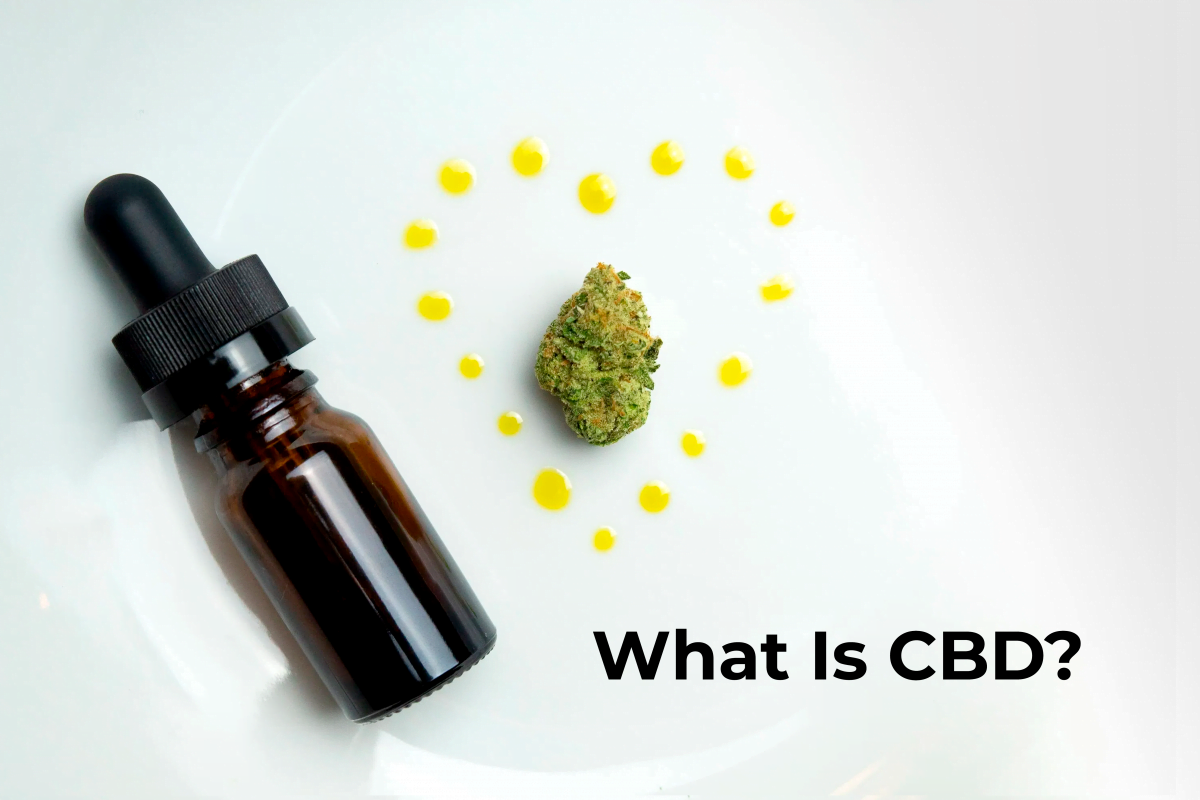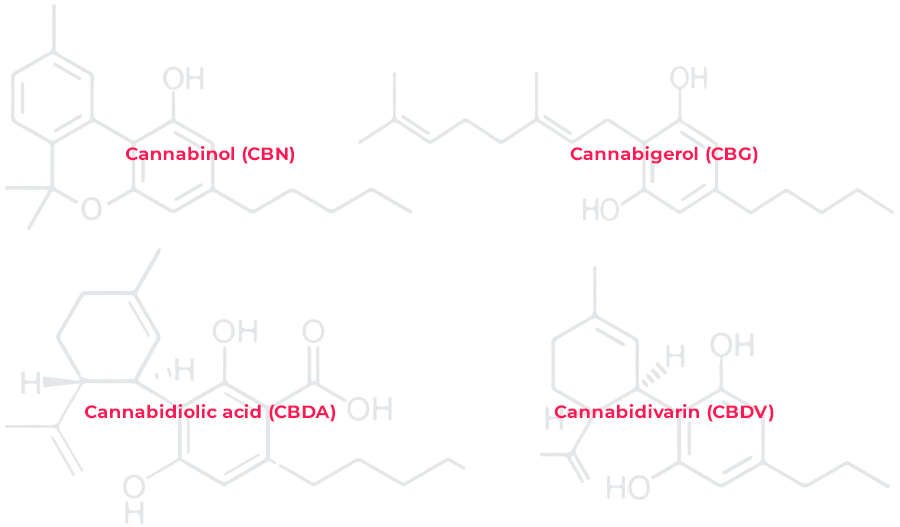What Is CBD?

Ever since the federal government passed the Farm Bill, a piece of legislation which removed industrial hemp from the Controlled Substances Act so it is no longer illegal, and therefore not subject to enforcement by the United States Drug Enforcement Administration, it seems that CBD—a hemp plant extract—makes the news in some fashion every day. But what exactly is CBD and why is it constantly showing up in your news feed?
CBD stands for cannabidiol and is just one of many cannabinoids found within the cannabis plant. Some of the other cannabinoids or chemical compounds found within the hemp plant include:
But perhaps the best known of all the cannabinoids is THC (tetrahydrocannabinol). Though this active ingredient also comes from the marijuana plant, it is very different than CBD.
One of the main things that set CBD apart from THC is the effect it has on the brain. Specifically, although THC is well-known for its psychoactive effects and giving users a feeling of being “high,” CBD does not have this impact on cognition.
That makes CBD extract easier to use without compromising safety during everyday activities that require a fair amount of focus and concentration, such as driving a car or caring for your children.
CBD is also different from THC from a legal standpoint, most notably when the CBD is extracted from the hemp plant. What does this mean?
When CBD is extracted from industrial hemp, it is legal because hemp is now legal in the US. Furthermore, by law, hemp cannot contain more than 0.3 percent THC.
Yet, if you look at the amount of THC (which is still illegal) that is in medical marijuana, it isn’t uncommon for users to be exposed to anywhere from 5 to 20 percent THC. [1]
To understand how CBD works, it helps to first understand a little bit about the human body’s endocannabinoid system.
The endocannabinoid system is a system that every person has, regardless of whether they use cannabis or take cannabinoids. Essentially, it is a system that helps regulate processes related to a variety of activities. [2]
This regulation occurs based on interactions between two key endocannabinoids manufactured within the human body (anandamide and 2-arachidonoylglyerol) and cannabinoid receptors, the latter of which are referred to as CB1 receptors and CB2 receptors.
CB1 receptors are located in your central nervous system and the CB2 receptors can be found in your peripheral nervous system (the nervous system which exists outside of your brain and spinal column), which includes the cells in your immune system.
When you take CBD, it interacts with these same receptors.
When it comes to the use of CBD extract, there are a number of different options.
The first option is in regard to the type of CBD as this cannabinoid is available in a variety of forms.
The type of form also impacts bioavailability.
The second option related to CBD is either a full spectrum CBD or a CBD isolate. What’s the difference?
Full spectrum CBD references a compound that, in addition to containing CBD, includes other cannabinoids, terpenes (the aromatic oils), and flavonoids.
CBD isolate, conversely, contains only one cannabinoid: CBD.
Although most CBD oil users typically report no negative side effects when taking this hemp extract, some have experienced diarrhea and fatigue and others report a change in appetite. [18]
If you take prescription medications, it’s also important to note that the CBD may negatively interact with them. [19] Namely, the medications at risk of interacting are those that are metabolized by the same enzymes as CBD.
Therefore, you’ll want to check with your primary care physician before ingesting CBD.
Because CBD comes from a cannabis plant, many users are concerned about whether this substance will cause a positive on a drug test.
According to workplace compliance experts, because CBD is not yet regulated, it may, but mainly because product labels may incorrectly state less than 0.3 percent THC.
In cases such as these, where a label is incorrect, it is possible that the THC will show up on a drug test.
This outlines the importance of choosing a reputable, manufacturer that sources its high-quality hemp inside the U.S.A., thus adhering to our national guidelines.
That said, now that the Farm Bill is in place, it is likely that more regulations will be put in place in the future. No doubt, this will impact users’ experience with CBD, as well as what constitutes its legality—both in the workplace and out—across the 50 states.
Sources:
[1] Shipman, M. “Is Hemp the Same Thing as Marijuana?” Phys.org. Feb 15, 2019. https://phys.org/news/2019-02-hemp-marijuana.html
[2] Raypole, C. “A Simple Guide to the Endocannabinoid System.” Healthline. May 17, 2019. https://www.healthline.com/health/endocannabinoid-system-2
[3] “Morbidity and Mortality Weekly Report: Prevalence of Chronic Pain and High-Impact Chronic Pain Among Adults – United States, 2016.” CDC.gov. Sep 14, 2018; 67(36): 1001-1006. https://www.cdc.gov/mmwr/volumes/67/wr/mm6736a2.htm
[4] Russo, E. “Cannabinoids in the Management of Difficult to Treat Pain.” Therapeutics and Clinical Risk Management. Feb 2008; 4(1): 245-259. https://www.ncbi.nlm.nih.gov/pmc/articles/PMC2503660/
[5] Corroon, J, & Phillips, J. “A Cross-Sectional Study of Cannabidiol Users.” Cannabis and Cannabinoid Research. 2018; 3(1): 152-161. https://www.ncbi.nlm.nih.gov/pmc/articles/PMC6043845/
[6] “Facts & Statistics.” Anxiety and Depression Association of America. Accessed Jul 29, 2019. https://adaa.org/about-adaa/press-room/facts-statistics
[7] Blessing, E, et al. “Cannabidiol as a Potential Treatment for Anxiety Disorders.” Neurotherapeutics. Oct 2015; 12(4): 825-836. https://www.ncbi.nlm.nih.gov/pmc/articles/PMC4604171/
[8] de Mello Schier, A, et al. “Antidepressant-Like and Anxiolytic-Like Effects of Cannabidiol: A Chemical Compound of Cannabis Sativa.” CNS & Neurological Disorders-Drug Targets. 2014; 13(6): 953-60. https://www.ncbi.nlm.nih.gov/pubmed/24923339
[9] “CBD: For Sleep and Insomnia.” American Sleep Association. Accessed Jul 29, 2019. https://www.sleepassociation.org/sleep-treatments/cbd/
[10] Perucca, E. “Cannabinoids in the Treatment of Epilepsy: Hard Evidence at Last?” Journal of Epilepsy Research. Dec 2017; 7(2): 61-76. https://www.ncbi.nlm.nih.gov/pmc/articles/PMC5767492/
[11] “FDA Approves First Drug Comprised of an Active Ingredient Derived From Marijuana to Treat Rare, Severe Forms of Epilepsy.” FDA.gov. Jun 26, 2019. https://www.fda.gov/news-events/press-announcements/fda-approves-first-drug-comprised-active-ingredient-derived-marijuana-treat-rare-severe-forms
[12] “Statistics.” Parkinson’s Foundation. Accessed Jul 29, 2019. https://www.parkinson.org/Understanding-Parkinsons/Statistics
[13] Peres, F, et al. “Cannabidiol as a Promising Strategy to Treat and Prevent Movement Disorders.” Frontiers in Pharmacology. 2018; 9: 482. https://www.ncbi.nlm.nih.gov/pmc/articles/PMC5958190/
[14] Cheng, D, et al. “Long-Term Cannabidiol Treatment Prevents the Development of Social Recognition Memory Deficits in Alzheimer’s Disease Transgenic Mice.” Journal of Alzheimer’s Disease. 2014; 42(4): 1383-96. https://www.ncbi.nlm.nih.gov/pubmed/25024347
[15] “Cannabis and Cannabinoids (PDQ®) – Health Professional Version.” National Cancer Institute. Accessed Jul 29, 2019. https://www.cancer.gov/about-cancer/treatment/cam/hp/cannabis-pdq
[16] Rudroff, T, & Sosnoff, J. “Cannabidiol to Improve Mobility in People with Multiple Sclerosis.” Frontiers in Neurology. 2018; 9: 183. https://www.ncbi.nlm.nih.gov/pmc/articles/PMC5874292/
[17] Cadena, A. “What is CBD Bioavailability and Why Does it Matter?” CBD+ Origin. Jun 26, 2018. https://medium.com/cbd-origin/what-is-cbd-bioavailability-and-why-does-it-matter-69d9a2e37e6c
[18] Kubala, J. “7 Benefits and Uses of CBD Oil (Plus Side Effects).” Healthline. Feb 26, 2018. https://www.healthline.com/nutrition/cbd-oil-benefits
[19] “ConsumerLab.com Answers: CBD Drug Interactions.” ConsumerLab.com. Accessed Jul 29, 2019. https://www.consumerlab.com/answers/cbd-interactions-with-other-drugs-medications/cbd-drug-interactions/

Founded in 2018, Spruce produces American-made, premium-quality, highly potent
CBD products.
Spruce Natural Labs
1053 E. Whitaker Mill Rd.
Suite 115-H
Raleigh, NC 27604, USA


SHOP
PAGES
CONTACT US
© 2022, Spruce Natural Labs LLC.
This product is not for use by or sale to persons under the age of 18. This product should be used only as directed on the label. It should not be used if you are pregnant or nursing. Consult with a physician before use if you have a serious medical condition or use prescription medications. A Doctor's advice should be sought before using Spruce. All trademarks and copyrights are property of their respective owners and are not affiliated with nor do they endorse this product. These statements have not been evaluated by the FDA. This product is not intended to diagnose, treat, cure or prevent any disease. Individual results will vary. By using this site, you agree to follow the Privacy Policy and all Terms & Conditions printed on this site. Void Where Prohibited by Law.











